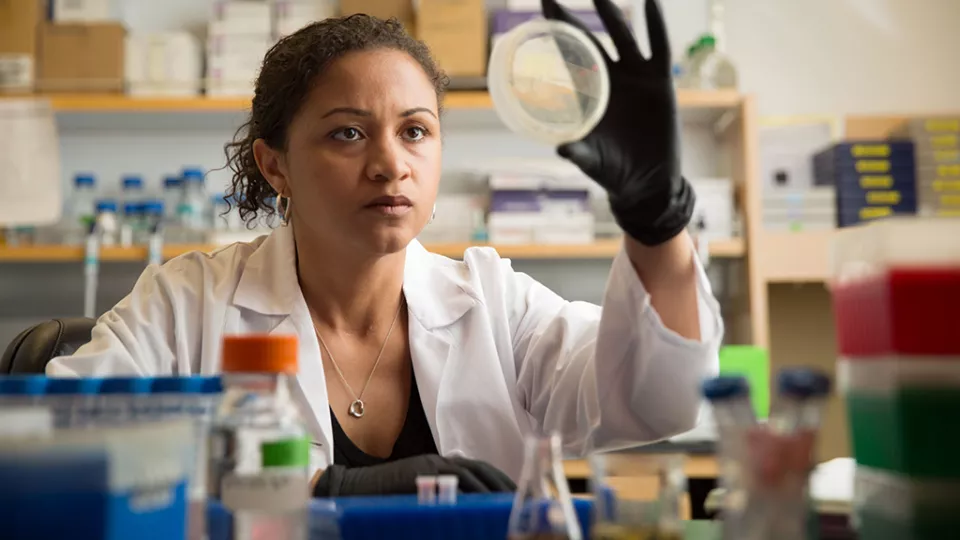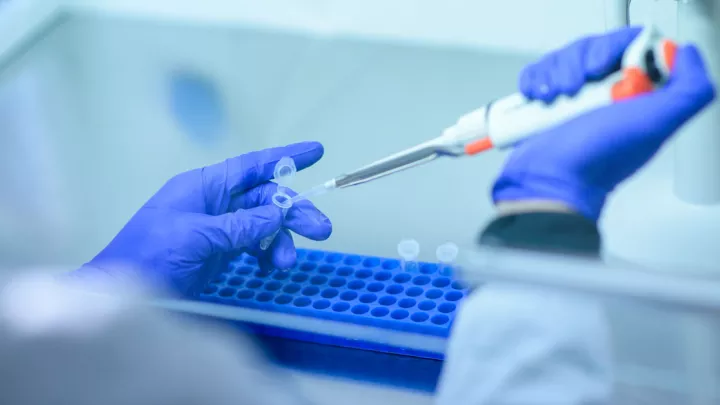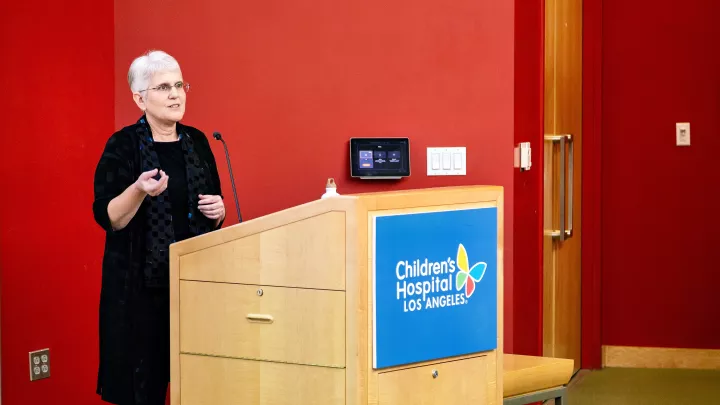
Senta Georgia, PhD, in her lab
Studying the Impacts of COVID-19 on Children
During the pandemic, Children’s Hospital Los Angeles researchers were among the first in the nation to report a spike in new cases of severe Type 2 diabetes in children.
Now, under an R01 grant from the National Institute of Diabetes and Digestive and Kidney Diseases, the investigators are taking a deeper look at whether COVID-19 infection may cause injury to pancreatic beta cells, which produce insulin.
The team—led by Senta Georgia, PhD, and Lily Chao, MD, MS—is also studying other impacts from COVID-19. Under a contract from the Food and Drug Administration (FDA), the researchers are examining how to potentially predict which children are likely to develop long COVID or multisystem inflammatory syndrome in children (MIS-C) after infection with SARS-CoV-2.
Does COVID-19 infect beta cells?

The team’s COVID-related research dates back to the start of the pandemic.
In March 2020, Dr. Chao—Director of Clinical Diabetes at CHLA—and her colleagues began noticing an increase in the number of children with new-onset Type 2 diabetes who had a serious complication: diabetic ketoacidosis (DKA).
She and Dr. Georgia began tracking cases and comparing them to prior years. Their resulting study—published in 2021 in Diabetes Care, the top endocrinology journal in the U.S.—found that 20% of new pediatric Type 2 diabetes cases at CHLA in 2020 required hospitalization for DKA. That compared with just 3% in 2019 and 9% in 2018.
But it was impossible to pinpoint whether COVID-19 was to blame. “There are multiple factors that could have contributed to that spike,” says Dr. Chao. “I don’t think we can ever say that a particular child got diabetes because they were previously infected with COVID.”
Still, the results inspired Dr. Georgia to take a deeper dive into how COVID-19 might be impacting insulin-producing cells. Preliminary data from her studies in preclinical models found that the virus directly infected beta cells, and that SARS-CoV-2 infection resulted in decreased beta cell function and survival.
Meanwhile, clinical studies from other centers found an increased likelihood of adults being diagnosed with Type 2 diabetes after they had COVID.
“Our hypothesis is that COVID-19 infection causes a subacute injury to insulin cells,” explains Dr. Georgia, who runs a basic and translational research program aimed at understanding the cellular biology of diabetes and developing novel therapeutics. “Our study now is trying to not only confirm if that’s true, but also see if your insulin cells can recover after that injury.”
Under the National Institutes of Health grant, Dr. Georgia and her team are analyzing blood samples from children who were admitted to CHLA early in the pandemic. They are comparing samples from four groups—those who were COVID-positive, COVID-negative, had diabetes or did not have diabetes—to see if they can detect signs of insulin cell injury in their blood.
Predicting long COVID
Under their FDA contract, Dr. Georgia and Dr. Chao are analyzing patient blood samples to look at inflammatory markers, DNA tissue profiles, metabolites and more in children and adults who had COVID, long COVID or MIS-C. Their team has expanded to include researchers from USC, UCLA and the University of Iowa to assist in these efforts.
They are then using machine learning to integrate data from these different profiles, along with clinical data. The goal is to develop an algorithm that could predict which children, based on these markers, are more likely to develop long COVID or MIS-C.
The team is currently recruiting eligible patients for this study who were previously treated at CHLA for long COVID or MIS-C. Participation would involve collecting a one-time blood sample from children.
“There are lots of studies looking at why adults get long COVID, but there’s very little being done to examine the post-acute effects of COVID on children,” Dr. Georgia says. “We are trying to gain more insights into which patients are most at risk.”


